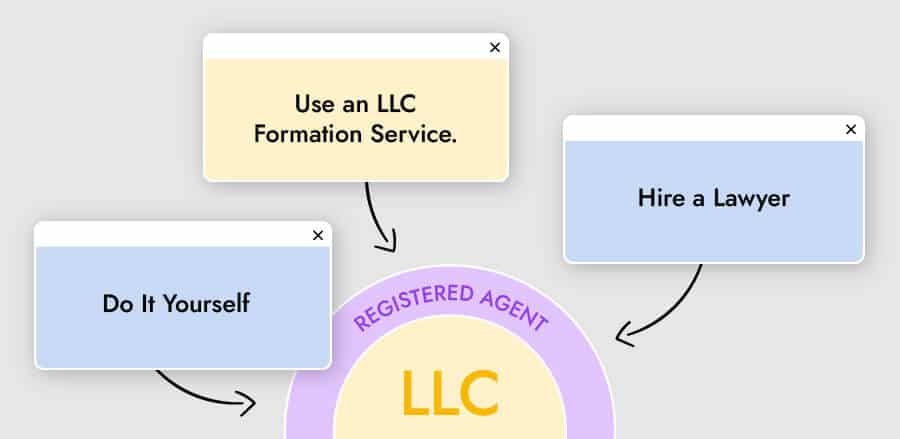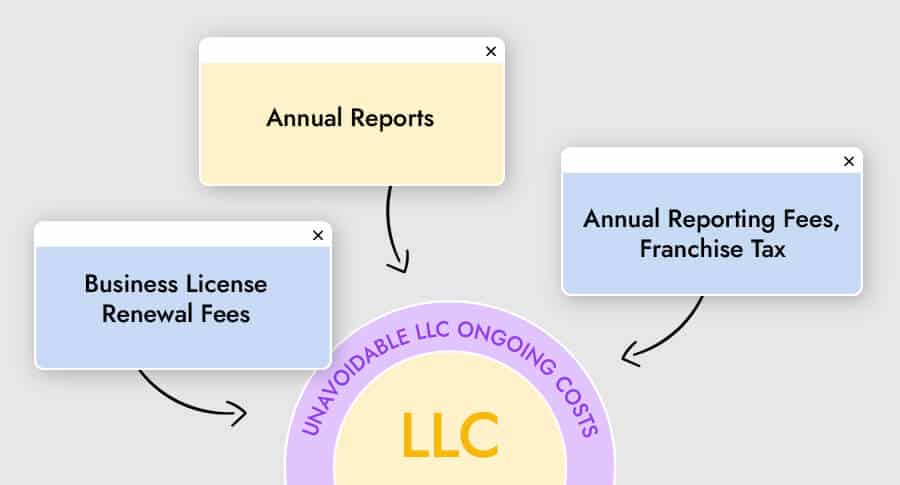State LLC Costs: Overview
LLC costs vary from state to state. Some are optional, like reserving your business name and designating a registered agent. While others are unavoidable, such as LLC filing fees.
The filing fees and annual fees below are updated for 2026, make sure to check the updated fee in the state you register your LLC:
| State | State Fee | Additional Fees | Total Fees | Annual Fee |
|---|---|---|---|---|
| Alabama LLC costs | $200.00 | $11 Processing Fee $25 Name Reservation | $236.00 | $100 |
| Alaska LLC Costs | $250.00 | – | $250.00 | $100 |
| Arizona LLC Costs | $50.00 | $35 Expedited Filing Fee | $85.00 | None |
| Arkansas LLC Costs | $40.00 | $5 Processing Fee | $45.00 | $150 |
| California LLC Costs | $70.00 | $5 Certefied Copy | $75.00 | $800 |
| Colorado LLC Costs | $50.00 | – | $50.00 | $10 |
| Connecticut LLC Costs | $120.00 | – | $120.00 | $80 |
| Delaware LLC Costs | $110.00 | $50 Expedited Filing Fee | $160.00 | $300 |
| District of Columbia LLC Costs | $99.00 | – | $99.00 | $300 |
| Florida LLC Costs | $130.00 | – | $130.00 | $138.75 |
| Georgia LLC Costs | $100.00 | $5 Processing Fee | $105.00 | $50 |
| Hawaii LLC Costs | $50.00 | $1 Processing Fee | $51.00 | $15 |
| Idaho LLC Costs | $100.00 | $3.5 Processing Fee | $103.50 | None |
| Illinois LLC Costs | $150.00 | $3.38 Processing Fee | $153.38 | $75 |
| Indiana LLC Costs | $95.00 | $2.04 Processing Fee | $97.04 | $30 |
| Iowa LLC Costs | $50.00 | – | $50.00 | $60 |
| Kansas LLC Costs | $160.00 | – | $160.00 | $50 |
| Kentucky LLC Costs | $40.00 | – | $40.00 | $15 |
| Louisiana LLC Costs | $100.00 | $5 Processing Fee | $105.00 | $30 |
| Maine LLC Costs | $175.00 | $3 Certificate of Formation$50 Expedited Filing Fee$26 Shipping Fee | $254.00 | $85 |
| Maryland LLC Costs | $100.00 | $4.5 Processing Fee$50 Expedited Filing Fee | $154.50 | $300 |
| Massachusetts LLC Costs | $500.00 | $20 Expedited Filing Fee | $520.00 | $500 |
| Michigan LLC Costs | $50.00 | – | $50.00 | $25 |
| Minnesota LLC Costs | $155.00 | – | $155.00 | $35 |
| Mississippi LLC Costs | $50.00 | $3.14 Processing Fee | $53.14 | $25 |
| Missouri LLC Costs | $50.00 | $1.25 Processing Fee | $51.25 | None |
| Montana LLC Costs | $35.00 | – | $35.00 | $20-$35 |
| Nebraska LLC Costs | $100.00 | $3 Processing Fee | $103.00 | $10-$30 |
| Nevada LLC Costs | $425.00 | $10.63 Processing Fee | $435.63 | $150-$400 |
| New Hampshire LLC Costs | $105.00 | $2 Processing Fee | $107.00 | $100 |
| New Jersey LLC Costs | $125.00 | $3.5 Processing Fee | $128.50 | $50 |
| New Mexico LLC Costs | $50.00 | $1.95 Processing Fee | $51.95 | None |
| New York LLC Costs | $200.00 | $5 Non-Certified Copy of Filing | $205.00 | $25-$4,500 |
| North Carolina LLC Costs | $125.00 | $3 Processing Fee | $128.00 | $200 |
| North Dakota LLC Costs | $135.00 | – | $135.00 | $50 |
| Ohio LLC Costs | $99.00 | – | $99.00 | None |
| Oklahoma LLC Costs | $100.00 | $4 Processing Fee | $104.00 | $25 |
| Oregon LLC Costs | $100.00 | – | $100.00 | $100 |
| Pennsylvania LLC Costs | $125.00 | – | $125.00 | None |
| Rhode Island LLC Costs | $150.00 | $6 Processing Fee | $156.00 | $50 |
| South Carolina LLC Costs | $110.00 | $15 Processing Fee | $125.00 | None |
| South Dakota LLC Costs | $150.00 | – | $150.00 | $50 |
| Tennessee LLC Costs | $300.00 (up to 6 members, $50 for each extra member) | $7.5 Processing Fee | $307.5 | $300-$3,000 + $50 per Member |
| Texas LLC Costs | $300.00 | – | $300.00 | None |
| Utah LLC Costs | $59.00 | – | $59.00 | $20 |
| Vermont LLC Costs | $155.00 | – | $155.00 | $35 |
| Virginia LLC Costs | $100.00 | – | $100.00 | $50 |
| Washington LLC Costs | $180.00 | $20 Processing Fee | $200.00 | $60 |
| West Virginia LLC Costs | $100.00 | – | $100.00 | $25 |
| Wisconsin LLC Costs | $130.00 | $1 Processing Fee | $131.00 | $25 |
| Wyoming LLC Costs | $100.00 | $3.75 Processing Fee | $103.75 | $60 |
LLC Formation Costs

There are 3 different fundamental ways to set up your basic limited liability company, all with different price tags.
LLC setup options
1. Do it yourself: It’s your cheapest immediate option, but the complicated paperwork and filing procedures can be challenging to navigate.
2. Hire a lawyer: If you’ve got the budget, you can pay a lawyer to do it for you; fees range from $1,000 to $1,500.
3. Use an LLC formation service: LLC formation services provide an excellent middle ground, specializing in forming LLCs for as little as 300$.
Now let’s look at the obligatory LLC formation costs:
LLC Filing Fees
The first LLC setup cost is registering it as a legal business entity by filing articles of organization with your secretary of state.
An article of organization is a one-time document and fee charged by your state to form your business as a legal entity. You can download the articles of organization form for free from your secretary of state’s office website.
There’s also filing fees, which vary state to state.
It’s important to notice that if you want to set up a foreign LLC, meaning that you’re operating in a state you’re not physically located in, the filing fees are generally higher.
State Filing Fees
State filing fees vary from $35 in Montana to $520 ($500 state fee + $20 expedited processing fee) in Massachusetts. You can pay the fee online, by mail, or in person. The formation times vary by state and you need to factor in additional expedited fees if you are in a rush.
In some states, you must pay a notary to witness and sign your articles of organization before submitting it. A notary is a public officer allowed to perform specific legal tasks. Costs vary ranging from $2 to $16 per signature.
But before you file, you should ensure your chosen LLC name is available. Otherwise, your state could refuse your application and filing fees are non-refundable (that’d be a bummer, amiright?). I’ll tell you how to check this later in the post, but we have something else to cover first.
Publication Requirements Fees
Publication fees apply when a state requires a new LLC to tell the public of its formation by publishing it in a local newspaper for 3 consecutive runs. A run can be one day per week for 3 weeks.
States that require you to publish a public notification are Arizona, Nebraska, and New York.
Costs can range from $600 to $1200, depending on your LLC’s office location, your state’s notification requirements, and the advertising rates charged by your local newspaper
LLC Business Licenses and Permits
Whether you’re selling hot dogs or pharmaceuticals, most businesses require permits and licenses to trade within the U.S.
License and permits requirements depend on 2 things:
1. Your location: Each state has its own licensing and permit regulatory requirements.
2. Your industry: You might need permits and licenses at a state or federal level to sell or provide certain products or services.
Licenses You Might Need and General Costs
- Sales tax id number: You can get a sales tax id for free in most states, but some charge $20
- Business license: Varies from $20 to $500 depending on the state
- Industry-specific licenses: The cost depends on your industry and can range from $50 to multiple thousands
- Certificate of occupancy: An average cost is around $100, but it varies depending on property location and size
- Occupational license fee: The average occupational license fee is $10 to $20, but filing fees can range from $40 to $250
On top of all that, you’ve got to know what your ongoing costs will be while waiting to turn a profit. Otherwise, you could run out of funds, and go bust (which I hope never happens to you!).
You can use a financial needs analysis to work those out.
Unavoidable Ongoing LLC Costs

Once your LLC is up and running, it’s your responsibility to check with your state and see if you should renew licenses, file reports, and pay a tax to trade.
Fortunately, most LLC ongoing costs don’t break the bank.
Business License Renewal Fees
Most states don’t require a business license to form an LLC, but you need one to run it.
Licenses are legal documents showing you’ve been approved to engage in specific business within your jurisdiction and can comply with local/state regulations.
States require you to renew your LLC local and state business license. Costs vary state to state, ranging from $16 every 2 years in Colorado to $287.50 annuallyin Alabama.
Annual Reports
An annual report (sometimes referred to as a Periodic Report or Statement of Information) is a document detailing your LLC’s activities throughout the prior year.
Its purpose is to provide details about current managing members and owners, your registered agent’s business address, and any changes that might have occurred since the last filing period.
Filing an annual report ensures your LLC stays compliant with all state regulations, aiding to preserve your limited liability protection, and flow-through tax status.
As the name suggests, most states require you to file reports every year, whereas some require a biennial report, once every 2 years, some a decennial report, every 10 years, or not at all for others.
Some states will send a reminder form, so you don’t miss a deadline. But if yours doesn’t, you can outsource to an annual report filing service.
Franchise Tax
An annual LLC franchise tax (also referred to as an annual fee) is a recurring fee you pay to your state every year you’re in business.
It’s a tax you must pay regardless of whether your LLC was profitable or not. If you don’t pay, your state will dissolve your LLC.
Fees range between states, from $150 in Arkansas to $800 in California.
Additional LLC Optional Fees
Some additional LLC costs are like added extras at checkout. Some extras you might not need at all, others could make your LLC more effective, and sometimes they can be essential to running a secure and successful business.
Let’s check out what some of those extras might be:
Registered Agent
If you were wondering what is a registered agent, it is someone who accepts legal documents on your LLC’s behalf (serves as an agent for service of process, among others). This individual can be anyone over 18, with an address in the LLC’s state of formation, and be available during regular business hours.
You don’t have to employ a registered agent service, but there are certain benefits to doing so. It might be beneficial if you’re doing business from home and don’t want your private address to be made public, or if you don’t keep regular business hours.
You’re only required to hire a registered agent when your LLC doesn’t have a physical address in your state.
You can do it yourself for free, or if you designate someone to be your registered agent, it can cost between $100 and $300 per year.
Operating Agreements
Operating agreements are an optional extra and you could write it yourself for free. But depending on your business’s structure, an operating agreement can be complicated and it might make sense to leave it to a professional.
Well written operating agreements outline how your company will run, including your company structure, management responsibilities, allocation of funds, and the purpose of your business.
You might need an LLC operating agreement for the following reasons:
- Single-member LLCs: To ensure you’re not viewed as a sole trader, thus aiding to preserve your limited liability status in litigation cases
- Multi-member LLCs: If there are internal disputes amongst members, an operating agreement serves as a go-to document that all members can review and rely on
Let’s review the 4 pricing options available:
1. Write it yourself: It’s free to write and file an operating agreement.
2. Purchase a template: You can buy an operating agreement template online from $50 to $200.
3. Hire a lawyer: If your LLC has several members or a complicated structure, you may need to hire a business lawyer. The average price for a single-member LLC is $300, rising to $3,000 plus for a multi-member.
4. An incorporation website: You can pay an online company to write and submit your operating agreement for as little as $99.
Applying for an EIN
You need an Employer Identification Number (EIN) to open a business bank account, apply for a business credit card, get financing, and pay taxes.
Businesses often offer and charge for this service. But you don’t need to pay if you apply for an EIN yourself using the IRS website or by contacting your secretary of state’s office.
Reserving your LLC name
You don’t have to reserve your LLC name before filing your articles of organization.
But if you’ve found the perfect business name and aren’t yet ready to form your business, you can apply to reserve it with your secretary of state’s office for up to 120 days.
Doing so can cost as little as $10 to $50, so it’s well worth the investment.
Filing a Fictitious Business Name Application (“DBA”)
You don’t have to trade using the business name you listed when filing your articles of organization.
You can use an alternative, fictitious business name, also known as a DBA (doing business as). You might do this if your LLC’s registered name isn’t good for branding and marketing strategies, or you don’t want to include the word LLC.
It’s purely optional, and many LLC’s see using the abbreviation as an advantage as it shows the company is a legal entity.
How to register a DBA varies from state to state. In some, you must apply with the secretary of state. While in others, you must file at the county level and in every county where your business has premises.
You may also be required to publish notification of intent of use in a local paper. All states charge a filing fee, ranging from $10 to $200.
Overall LLC Costs – Summary
Looking for a quick summary of your LLC set-up costs? It’s important to notice that fees vary between states and you should check out the relevant information for your state. Below are the most common fees you can expect to pay:
| Annual report | 0 – $500 |
| Business licenses & permits | Vary by municipality, but fees for a business license range from $10 to $1,000 |
| Filing a DBA (optional) | $10 – $200 per assumed name |
| Annual franchise tax | Depending if the state has that tax. Can be up to $1,000 or more |
| LLC filing fee | $40 – $500 |
| Operating agreement (optional) | 0 – $1,000 if you hire an attorney or a service |
| Registered agent service (optional) | $199 to $400 |
| Reserve business name (optional) | $10 – $50 |
Conclusion
As we’ve seen, establishing an LLC requires lots of fees (sigh). It might sound overwhelming and expensive, but remember that fees depend on which state you’re operating and what licenses you may require for your business.
But many small business owners feel that these costs are worth it for all the benefits an LLC provides. And now that you have all the information you need, you’re closer to achieving your business goals of forming an LLC.
FAQ
The main expenses to start an LLC include state formation fees, which range from $50 to $500, plus optional costs for a registered agent service and business licenses.
Your total cost depends on your state’s filing fees, whether you use a formation service, registered agent fees, business license requirements, and any expedited processing charges.
Most states require a mandatory annual (or biennial) report to be filed every year, which is necessary to maintain good standing with the state. There’s a filing fee for the annual report. Other annual payments can be different franchise taxes, but not all states have those taxes.
Yes, you can pay yourself a salary from your LLC. There are different methods depending on your selected type of LLC (Single-member LLC, Multi-member LLC) – Paying with an owner’s draw, paying as a partnership, using guaranteed payments or opting to be taxed as a C/S Corp and paying as an employee.
Generally speaking, it could. With an LLC you have the flexibility to elect the way you’ll be taxed – as a sole-proprietorship, as a partnership or as a corporation. Each has its own tax benefits and it’s advisable to consult a CPA to construct the best tax method for your specific business.
Generally speaking, yes. Most states charge a higher filing fee for foreign LLCs (LLCs with a physical location in a state but want to conduct business in a different state). Usually the differences aren’t massive, but are still a bit higher. Check out your selected state for the filing fees.
